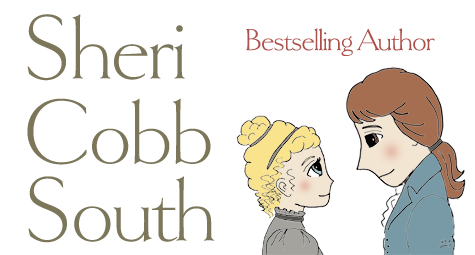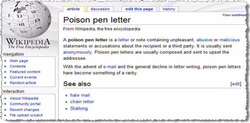“On page 11 of ‘A Dead Bore’ the correct word should be eminently in the sentence: ‘Although imminently suitable, …’.
”Also, in the same sentence you wrote ‘…was so daunting …’ As daunting means intimidating, why would Lady Fieldhurst accept the invitation that very day? Wouldn’t she hesitate to accept if she was intimidated?
“I gave up reading at this point.”
I have to admit, the writer (I can hardly call him a “fan,” except, perhaps, in the worst sense of “fanatic,” and given that he quit reading on page 11, “reader” would hardly seem to fit, either) is correct in the first instance. The “eminent/imminent” distinction is one of those subtleties of language that I have to be constantly aware of, and in this case it managed to slip by not only me, but my critique partner and my editor at Five Star as well.
In the second example, however—and I admit to going back to look, secure in my understanding of the word “daunting”—he completely misread the sentence. Apparently he was so offended by the “eminent/imminent” issue that his reading comprehension skills were affected. Poor guy.
Now, I’ll admit, I hate it when I make this sort of error—most every writer I know does—but these things happen, and will happen as long as writers are human. That same typo (or “mindo” in this case, as it was my mind taking a brief hiatus, not my fingers hitting a wrong key, that was responsible) that jumps out at a reader is surprisingly difficult to spot when the words are my own. I knew what I “meant” to say, and that’s what I read. Every writer I know has this same dilemma.
Don’t get me wrong. Every reader has the right to put aside a book that isn’t working for them. I’m sure we’ve all done it; I know I have. And everyone has their hot buttons, things are deal breakers when it comes to finishing a book or not. Maybe it’s because I was the target here, but I thought this one gaffe was pretty small, compared to some I’ve seen. Ironically, just before I received this email I’d finished a book in which the author cited “The Lady or the Tiger?” a full eighty years before the short story of that name was published. While it did pull me briefly out of the story, I didn’t throw the book down in disgust. In fact, I kept on reading, and would have cheated myself out of a very enjoyable read if I had done otherwise. While as for contacting the author to point out her error and inform her that I was casting the book aside, and why—well, such a thing would never cross my mind. Who does that, anyway?
Seriously, I’d really like to know. What did the writer of the email hope to accomplish? Given that the edition he was reading was published in 2008, there was nothing I could do about it at this late date. (I might also add that this book earned me my first-ever review in Publishers Weekly, who called it “delightful,” so apparently it had some redeeming qualities.) What did the writer get out of this, except perhaps a brief feeling of superiority? Perhaps more important to me personally was the question: what was I to do about it? How should I respond?
I wrestled with that one all afternoon. Maybe I could send a very polite and charming email, acknowledging my own error in the first instance, and pointing out his in the second. Then I could offer an exchange: if he would give the book another try, I would promise to be more careful with my eminent/imminents in the future. But no, polite and charming or not, wasn’t my real goal to say “I’m right and you’re wrong?” Wasn’t that exactly what he’d done to me? And, that being the case, would I really change his mind, even if he agreed to such a bargain? Or would he be that much more determined to catch me in some new error?
So what did I do? Nothing. I decided not to engage with him in any way. Was it satisfying? Of course not. Part of me still wants to point out his error, as a gentle reminder to “let him who is without sin cast the first stone.” But unsatisfying as it is, I know silence is not only the best policy, but the only real option. I’ll have to be content with imagining his frustration as he wonders if I’ve received his email yet, or if its arrival is still imminent. (Sorry, I couldn’t resist.) Better yet, I can stay busy preparing for the release of the next book in the series, coming out in November.
Because as they say, success is the best revenge.




Boy, Sheri, I can identify with you! Those homophones (or near-homophones in the case you cited) are the sneakiest little devils to ever plague a writer. The creative brain that creates our stories doesn’t give a rip about spelling; it just wants to get those ideas on paper. And our saner, editor-brain side has a tendency to read what was intended, not what’s actually there. Many of my bloopers have made it through several edits of the work, countless readings of it by myself, and numerous critique partners’ readings. For my first book, one made it all the way to the final proofreading at my then-publishing house — and it also was right there on the first page, for a reader like yours to comment on — but mine had a happier ending, for it was caught at the house in time to be changed. On the other hand, I’m usually quick to notice them when I’m reading. But I’d never react as your “fan” did. I’d give a little chuckle about human fallacy and go on. Some of them are unintentionally hilarious. You responded the only way you could. Engaging with people who get some kind of satisfaction in pointing out others’ errors is fruitless, and only causes more heartache than dismissing it.
Judith, I’m glad your error was caught in time–it might have saved you from getting an email like the one I got! And I know what you mean about some mistakes being unintentionally hilarious. Do you remember the historical a while back where the hero rides off on his stallion, but when he reaches town, he’s riding a gelding? That must have been a really rough ride! On the other hand, that book may turn out to be one of those that sells for a fortune someday BECAUSE of the error; you never know!
Coming from the perspective of a reader, not an author, that error certainly wouldn’t take me out of the story. I would never point out that kind of error unless I were actually in the position of proof reading, or the author had asked for comments. I have heard many authors say that it’s best not to engage in a conversation with a person who sends that kind of criticism, as they may retaliate, and cause real grief. Still – you do have to wonder why.
Blue, it’s good to hear from a reader that it wouldn’t pull you out of the story. Since the book was first published in 2008 and this is the first I’ve heard of it, I suspect most readers would agree with you. And I, for one, am glad of it!
The thirst for recognition, approbation, or the pleasant feeling of some sort of intellectual superiority, often leads to people to make nit-picky criticisms. I like Miss Manners’ guide as to whether or not to offer a criticism: can the mistake or mishap be corrected easily? That said, I think we would also do well to check our motives for criticizing, and remedy them instead.
Julie P., I’ve wondered if this guy is an unpublished author. In my experience, no one can be any pickier than someone who approaches books with the mentality of, “If THIS got published, then why can’t I?” I’ve been on that side of the equation, too, but although it can be frustrating, it’s no excuse for being nasty! I agree that Miss Manners’ guide is a good rule to follow.
Facebook has spoiled me. I was looking for the “Like” to click on Blue and Julie’s comments!
Hee, hee! Now I want to “Like” yours, as well!
That’s it? THAT’S IT? This guy went ballistic over one minor error and something he read wrong? It takes all kinds, but sometimes you wonder. Keep writing and forget about him.
Thanks, Linda! I have to confess, the expression “It takes all kinds” always makes me think of the old “Peanuts” comic strip, where Charlie Brown concludes that “some kinds we could do without.” Good ol’ Charlie Brown’s observation seems fitting here!
I just read recently about an author who got a similar letter and wrote back (probably shouldn’t have), and said that since the book was already in print there wasn’t much she could do about it. The person who wrote the email put in her blog that the author didn’t care about her work being accurate. :;sigh::
Callie, I wanted to point that out, too. Given this author’s experience, it confirms that I did the right thing by ignoring him. It seems to be a no-win situation.
Sheri,
When I write historicals I read contemporaries, and often series from Harlequin, I can say without free of contradiction, not one of the books I’ve read over the last year have been free of mistakes. Why doesn’t this guy take on one of the big six? Smart move to say nothing and ignore the idiot. If this is the only way he can feel worthy, then he is in very bad shape and needs a good doctor.
Opps! Even in a short blog mistakes happen. Instead of free of contradiction, it should have been fear. Sorry about that.